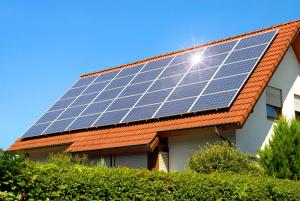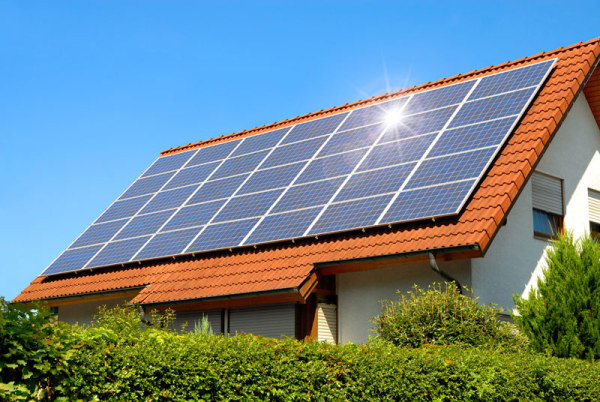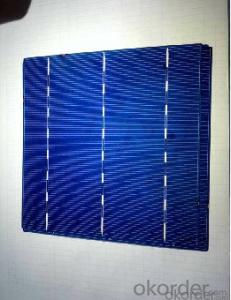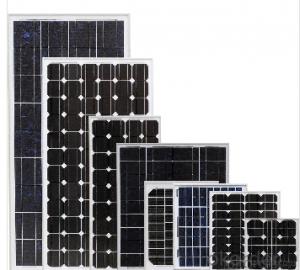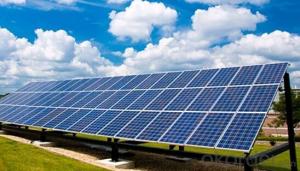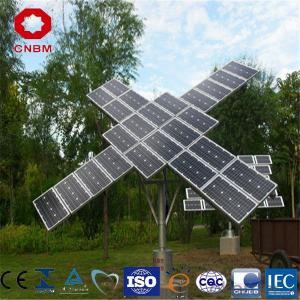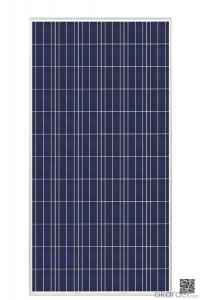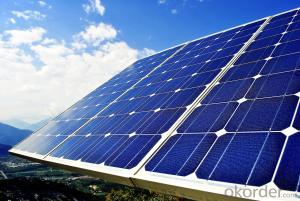Best Solar Panels for Rv Boondocking Poly Solar Module1
- Loading Port:
- Tianjin
- Payment Terms:
- TT OR LC
- Min Order Qty:
- -
- Supply Capability:
- 300mw watt/month
OKorder Service Pledge
OKorder Financial Service
You Might Also Like
Solar Module
ABOUT YINGLI GREEN ENERGY
Yingli Green Energy Holding Company Limited (NYSE: YGE) is one of
the world’s largest fully vertically integrated PV manufacturers, which
markets its products under the brand “Yingli Solar“. With over 7.0GW
of modules installed globally, we are a leading solar energy company
built upon proven product reliability and sustainable performance. We
are the fi rst renewable energy company and the fi rst Chinese company
to sponsor the FIFA World CupTM.
PERFORMANCE
- High effi ciency, multicrystalline silicon solar cells with high transmission
and textured glass deliver a module effi ciency of up to 16.0%,
minimizing installation costs and maximizing the kWh output of your
system per unit area.
- Tight positive power tolerance of 0W to +5W ensures you receive
modules at or above nameplate power and contributes to minimizing
module mismatch losses leading to improved system yield.
- Top ranking in the “TÜV Rheinland Energy Yield Test” and the
“PHOTON Test” demonstrates high performance and annual energy
production.
RELIABILITY
- Tests by independent laboratories prove that Yingli Solar modules:
Fully conform to certifi cation and regulatory standards.
Withstand wind loads of up to 2.4kPa and snow loads of up to
5.4kPa, confi rming mechanical stability.
Successfully endure ammonia and salt-mist exposure at the highest
severity level, ensuring their performance in adverse conditions.
- Manufacturing facility certifi ed by TÜV Rheinland to ISO 9001:2008,
ISO 14001:2004 and BS OHSAS 18001:2007.
WARRANTIES
- 10-year limited product warranty1.
- Limited power warranty1: 10 years at 91.2% of the minimal rated power
output, 25 years at 80.7% of the minimal rated power output.
1In compliance with our Warranty Terms and Conditions.
QUALIFICATIONS & CERTIFICATES
IEC 61215, IEC 61730, MCS, CE, ISO 9001:2008, ISO 14001:2004, BS OHSAS
18001:2007, PV Cycle, SA 8000
ELECTRICAL PERFORMANCE
Electrical parameters at Standard Test Conditions (STC)
Module type YLxxxP-29b (xxx=Pmax)
Power output Pmax W 260 255 250 245 240
Power output tolerances ΔPmax W 0 / + 5
Module effi ciency ηm % 16.0 15.7 15.4 15.1 14.8
Voltage at Pmax Vmpp V 30.3 30.0 29.8 29.6 29.3
Current at Pmax Impp A 8.59 8.49 8.39 8.28 8.18
Open-circuit voltage Voc V 37.7 37.7 37.6 37.5 37.5
Short-circuit current Isc A 9.09 9.01 8.92 8.83 8.75
Electrical parameters at Nominal Operating Cell Temperature (NOCT)
Power output Pmax W 189.7 186.0 182.4 178.7 175.1
Voltage at Pmax Vmpp V 27.6 27.4 27.2 27.0 26.8
Current at Pmax Impp A 6.87 6.79 6.71 6.62 6.54
Open-circuit voltage Voc V 34.8 34.8 34.7 34.6 34.6
Short-circuit current Isc A 7.35 7.28 7.21 7.14 7.07
STC: 1000W/m2 irradiance, 25°C cell temperature, AM1.5g spectrum according to EN 60904-3.
Average relative effi ciency reduction of 3.3% at 200W/m2 according to EN 60904-1.
NOCT: open-circuit module operation temperature at 800W/m2 irradiance, 20°C ambient temperature, 1m/s wind speed.
OPERATING CONDITIONS
Max. system voltage 1000VDC
Max. series fuse rating 15A
Limiting reverse current 15A
Operating temperature range -40°C to 85°C
Max. static load, front (e.g., snow) 5400Pa
Max. static load, back (e.g., wind) 2400Pa
Max. hailstone impact (diameter / velocity) 25mm / 23m/s
CONSTRUCTION MATERIALS
Front cover (material / thickness) low-iron tempered glass / 3.2mm
Cell (quantity / material / dimensions /
number of busbars)
60 / multicrystalline silicon / 156mm x 156mm / 2 or 3
Encapsulant (material) ethylene vinyl acetate (EVA)
Frame (material / color / anodization color /
edge sealing) anodized aluminum alloy / silver / clear / silicone or tape
Junction box (protection degree) ≥ IP65
Cable (length / cross-sectional area) 1000mm / 4mm2
Plug connector
(type / protection degree) MC4 / IP67 or YT08-1 / IP67 or Amphenol H4 / IP68
PACKAGING SPECIFICATIONS
Number of modules per pallet 29
Number of pallets per 40' container 28
Packaging box dimensions
(L / W / H) 1700mm / 1135mm / 1165mm
Box weight 568kg
Unit: mm
• Due to continuous innovation, research and product improvement, the specifi cations in this product information sheet are subject to change
without prior notice. The specifi cations may deviate slightly and are not guaranteed.
• The data do not refer to a single module and they are not part of the offer, they only serve for comparison to different module types
- Q: I know that there is a life expectancy for solar panels, and I suppose, the technology involved. Any information?
- Great okorder
- Q: Can solar panels be installed on military installations?
- Yes, solar panels can be installed on military installations. In fact, many military bases around the world have started incorporating solar energy systems to reduce their dependence on traditional sources of energy and enhance their sustainability efforts. Solar panels not only help to decrease the environmental impact but also provide a reliable and secure source of electricity, making them an ideal choice for military installations.
- Q: in the afternoon sun heat increases to high level due to which the panels heats up very high now my question is this heat will effect the panels life time and will damage the panels or not ??
- Some are better than others. It depends on the manufacturing technique. All will degrade over time, some over decades, others over months (if they're defective).
- Q: I am seriously thinking about installing PhotoVoltais Solar panels (that generate electricity) on my roof. Besides the usual (cost, ROI, etc.), I was researching for the maintenance of these panels. We have tall trees around the house and needles and leaves fall on our roof all the time... not to mention the dirt and grime that collects over time.Do these decrease the capacity of the panels? Do the panels require a regular maintenance?Thanks!
- I don't know if the guy is right about cells burning out if they are covered. You should look on the Internet for insolation tables for your area to see the effective hours of sunlight. Then guesstimate the percentage of time the panels will be shaded. Those trees may make the solar thing a poor idea. He is right about the trees reducing you efficiency. If a panel is shaded about 0 percent, its output drops to close to zero. My panels are five years old, and I have washed them twice. There as been no noticeable dropoff in output.
- Q: Can it be used on a cellphone so u never have to worry about low battery?
- A solar panel (photovoltaic module or photovoltaic panel) is a packaged interconnected assembly of solar cells, also known as photovoltaic cells. The solar panel can be used as a component of a larger photovoltaic system to generate and supply electricity in commercial and residential applications.
- Q: I have an electric bicycle that I travel to work by, pulling a modified child carrying trailer that holds two 2 volt deep cycle batteries in series to power the 24 volt bike motor. I'm thinking about adding a 50 watt solar panel (or larger depending on the room I can make available) to charge while I'm at work and to provide some extra juice while on my more distant travels.Can I get a solar panel to charge them while they're connected the way they are: in series? Does charging work that way?I've read that in order to charge the 24 volt battery setup (if the answer to the Q above is yes), the output from my solar panel would need to be a little more than 24 volts. Is this true? If so, how many volts?Since the bike is supposed to be powered at 24 volts and I have an x-volt (x gt; 24v) solar panel connected to it, will this cause any damage to the controller or other components while running them?Will it help supply power even while the motor is being run?Thanks.
- A solar panel to charge a 2V battery has 36 cells in series. This allows for temperature of the panel up to 60°C, and the maximum required charge voltage. For a 24V battery, 2 panels in series. A 24V battery requires around 28-29V, but look up your battery data sheet to be certain. A specialized converter using electronics could charge a 24V battery with a 2V panel. The system voltage is controlled by the battery unless the battery is faulty. The 2 panels in series could be 42 volts no load, but the battery pulls this down to whatever is required by the battery. This is because the panels are a current source, the current is determined by illumination, and attempts to draw more result in reduced voltage. Even a short circuited panel delivers approx. the same current with no voltage. The battery voltage varies from around 20V (really flat) to around 28V (really charged). A 30W panel is around .75A, considering the optimum panel voltage for power is around 7V for 36 cells. This is small compared with what you are using. The battery wastes about 30% of the power, in chemical conversions. The time to charge it is 4h at the 0h rate, which is Ah/0. (i.e. ampere hours)
- Q: im interested in starting a solar panel manufacturing company. ive researched on how to make them and it doesnt look too hard, and is definitely something i can figure out. i would be starting from nothing so my question is what are the chances of me actually selling a lot of panels and the business actually succeding?thanks
- No okorder 3) Figure out how much labor and material cost would go into each panel. Would you locate in the US? It's hard to beat the big players in China, in this commodity market. It would be like having a small company to make laptops, and trying to beat HP, Dell,and Lenovo.
- Q: I want to plug my solar system battery bank into my transfer switch on my cabin when not using a generator. The transfer switch will handle 220 volt from my generator. How do I get a 220 volt inverter that runs 60 hz or do all of them run 50 hz.I see plenty of 20 volt 60 hz. I'm at the point of needing to order one and I'm not sure.
- Investors in this ground-breaking technology include Rockport Capital Partners, Third Point Ventures and Applied Ventures, the venture capital arm of solar equipment manufacturer Applied Materials. Enphase Energy's CEO Paul Nahi said the company raised money earlier than expected due to strong demand for its microinverters. So what are these microinverters? The Enphase Micro-inverter shifts DC to AC conversion from a large, centralized inverter to a compact unit attached directly to each solar module in the power system. Distributing the conversion process to each module makes the entire solar power system more productive, reliable, and smarter than traditional solar panel inverter systems. Usually, one single inverter is dedicated to a rooftop array of panels for a homeowner. Enphase Energy, however, have built a DC-to-AC inverter that is placed on each single panel. This makes it more reliable than a centralized inverter and more efficient, so panels can generate more electricity, Nahi said. Enphase has already started shipping its microinverters and has tied up deals with several panel distributors and installers. The future of inverters? Enphase Energy has been able to improve the DC-to-AC conversion efficiency to around 95%. Because of this, Nahi predicted more companies will turn to decentralized inverters. There's been very little question on the benefits of microinverters, but people didn't think it was possible to get the efficiency levels required, he said. Now it seems that they have. If you are looking for high quality, low price solar panel inverters please visit my UK store by clicking here. For our US store click here. To return to our solar power news page. To return to our Total Solar Energy home page.
- Q: I am looking to run 2 basic shoplights, each with 2- 32 watt T8 flourecent tubes for 6 hours a day for an indoor garden. Location WI.
- Lets say, for a simple approximation, that the 45 watt panel produces 45 watts /3 of the time and nothing the rest of the time. Each day, this will produce 8 hours times 45 watts = 360 watt hours. Also assume the battery charge controller and inverter waste half of that power, leaving 80 watt hours per day. If you use compact fluorescent lamps, that would allow you to burn 80 watts worth for an hour every day, or 90 watts for 2 hours, etc. That is a lot of light for a shed. You might consider using much less efficient tungsten filament lamps, but eliminate the inverter and choose low voltage (automotive) lamps that can run directly across the battery and lower the total cost, but give you only about half the light times time. The main advantage of the inverter might be that it would allow you to use small power tools or appliances in the shed. -- Regards, John Popelish
- Q: Can solar panels be used in areas with high levels of saltwater exposure?
- Yes, solar panels can be used in areas with high levels of saltwater exposure. However, regular maintenance and cleaning may be required to remove salt deposits and prevent corrosion. Additionally, using materials with high corrosion resistance, such as marine-grade stainless steel, can help prolong the lifespan of the solar panels in such environments.
Send your message to us
Best Solar Panels for Rv Boondocking Poly Solar Module1
- Loading Port:
- Tianjin
- Payment Terms:
- TT OR LC
- Min Order Qty:
- -
- Supply Capability:
- 300mw watt/month
OKorder Service Pledge
OKorder Financial Service
Similar products
Hot products
Hot Searches
Related keywords
